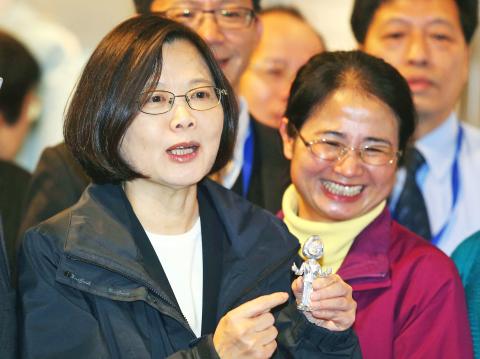President-elect Tsai Ing-wen (蔡英文) yesterday visited the nation’s main weapons research and development institute to learn more about the defense industry, one of the areas she has pledged to bolster after she takes office on May 20.
During her visit to the National Chungshan Institute of Science and Technology in Taoyuan, Tsai was briefed on the institute’s projects, including the Hsiung Feng III anti-ship missile and the Tien Kung III surface-to-air missile, both of which are locally developed and constitute the nation’s main missile systems.
Tsai was also briefed on the institute’s Cardinal Mini-UAV (uncrewed aerial vehicle) that can be launched by hand, as well as telecommunications systems, electromagnetic protection systems, power storage systems and the ground control center of an international space project called Alpha Magnetic Spectrometer.

Photo: CNA
During the one-hour tour, Tsai tested a 3D device that simulates a communications system used by military personnel in various military vehicles.
Tsai was greeted and accompanied by institute president Chang Kuan-chun (張冠群) to learn more about the developments in the local defense industry.
One main focus of Tsai’s campaign platform was a pledge to bolster the development of five major industries in Taiwan, including the defense industry, in an effort to boost the nation’s economy.
Tsai has said that her administration will make every effort to build a self-reliant defense industry by contracting local companies and institutes for arms procurement if the weapons and military equipment can be manufactured locally.
Tsai’s visit to the institute was part of a tour to enable her to learn more about the developments in various industries in the nation.

TRAFFIC SAFETY RULES: A positive result in a drug test would result in a two-year license suspension for the driver and vehicle, and a fine of up to NT$180,000 The Ministry of Transportation and Communications is to authorize police to conduct roadside saliva tests by the end of the year to deter people from driving while under the influence of narcotics, it said yesterday. The ministry last month unveiled a draft of amended regulations governing traffic safety rules and penalties, which included provisions empowering police to conduct mandatory saliva tests on drivers. While currently rules authorize police to use oral fluid testing kits for signs of drug use, they do not establish penalties for noncompliance or operating procedures for officers to follow, the ministry said. The proposed changes to the regulations require

Taipei, New Taipei City, Keelung and Taoyuan would issue a decision at 8pm on whether to cancel work and school tomorrow due to forecasted heavy rain, Keelung Mayor Hsieh Kuo-liang (謝國樑) said today. Hsieh told reporters that absent some pressing reason, the four northern cities would announce the decision jointly at 8pm. Keelung is expected to receive between 300mm and 490mm of rain in the period from 2pm today through 2pm tomorrow, Central Weather Administration data showed. Keelung City Government regulations stipulate that school and work can be canceled if rain totals in mountainous or low-elevation areas are forecast to exceed 350mm in

1.4nm WAFERS: While TSMC is gearing up to expand its overseas production, it would also continue to invest in Taiwan, company chairman and CEO C.C. Wei said Taiwan Semiconductor Manufacturing Co (TSMC) has applied for permission to construct a new plant in the Central Taiwan Science Park (中部科學園區), which it would use for the production of new high-speed wafers, the National Science and Technology Council said yesterday. The council, which supervises three major science parks in Taiwan, confirmed that the Central Taiwan Science Park Bureau had received an application on Friday from TSMC, the world’s largest contract chipmaker, to commence work on the new A14 fab. A14 technology, a 1.4 nanometer (nm) process, is designed to drive artificial intelligence transformation by enabling faster computing and greater power

China Airlines Ltd (CAL) yesterday morning joined SkyTeam’s Aviation Challenge for the fourth time, operating a demonstration flight for “net zero carbon emissions” from Taiwan Taoyuan International Airport to Bangkok. The flight used sustainable aviation fuel (SAF) at a ratio of up to 40 percent, the highest proportion CAL has achieved to date, the nation’s largest carrier said. Since April, SAF has become available to Taiwanese international carriers at Taipei International Airport (Songshan airport), Kaohsiung International Airport and Taoyuan airport. In previous challenges, CAL operated “net zero carbon emission flights” to Singapore and Japan. At a ceremony at Taoyuan airport, China Airlines chief sustainability